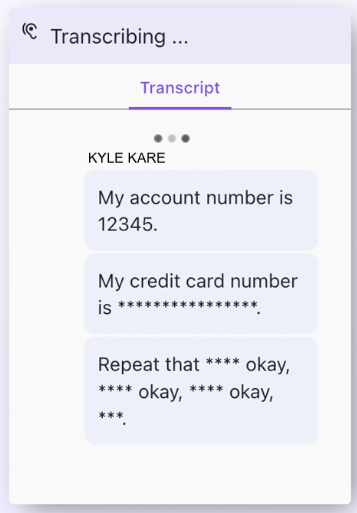PII Redaction uses Dialpad AI to automatically detect sensitive numeric data and remove it, while keeping the rest of the conversation details intact. Using advanced algorithms and machine learning, sensitive customer information (think social security numbers, credit card numbers, and more) is kept away from unauthorized eyes.
Let's dive into the details.
EAP feature
PII redaction is currently in an Early Adopter Program and is not yet available to all users.
If you'd like to enroll in this program, submit your application here.
Turn on PII redaction
PII redaction is a company-wide setting, meaning once we've turned on this feature for your company, you'll see PII redaction in each of your users' calls — the only thing you need to do is turn on Dialpad AI.
Once enabled, live call transcripts will redact sensitive numeric data and replace it with asterisks, in real-time.

Once the call ends, your call summaries will display redacted data as asterisks.
.png) What is personally identifiable information?
What is personally identifiable information?
Personally Identifiable Information (PII) is information that is directly, or indirectly, related to a specific person.
Currently, Dialpad AI redacts numeric PII data only.
Credit card numbers and personal identification numbers (such as your Social Security or Social Insurance number) will be redacted, along with unrecognized numbers more than 3 digits long (think CVC codes).
Don't worry, not all numeric data will be redacted! Dialpad automatically recognizes and preserves phone numbers, account/order numbers, as well as date, time, and currency notations.
Frequently asked questions
Is PII redaction available on all Dialpad platforms?
Yes! PII redaction occurs on live transcripts for Dialpad calls and Dialpad Meetings. Once the call ends, the transcript displays the redacted text.
Does this make Dialpad PCI-certified?
Not just yet. This capability is one of several features designed to help customers with PCI obligations; however, Dialpad is not yet PCI-certified.
Can I use PII redaction in any language?
Not currently, but we're working on it! For now, PII redaction is available only in English, but stay tuned as we add more languages.
Does PII redaction work in audio recordings?
Yes! We now support audio redaction. Reach out to your Customer Success Manager if you’d like to get enrolled.
Note
Dialpad creates a short, temporary transcript after each call to find and redact PII. This happens even when AI features are turned off, and the transcript is deleted immediately.
How accurate is PII redaction?
PII redaction is about 95% accurate, but because it relies on predictive AI, it isn’t perfect, so we recommend reviewing the results to ensure they meet your needs.
What about non-numeric personal information?
Dialpad offers PII redaction for numeric details only. We are still developing this feature and will soon add additional functionality.
Does PII redaction work for in-app messaging or external SMS messages?
Not yet. Redaction currently only applies in live and post-call transcripts.
However, messages sent via a Dialpad Digital Engagement channel will be redacted.
Can I un-redact information once it has been redacted?
No. Dialpad does not offer a way to recall any redacted information. This is what ensures the data is secure!
I have feedback, who can I talk to?
We want to hear your thoughts! Please send PI redaction feedback to AI-feedback@dialpad.com